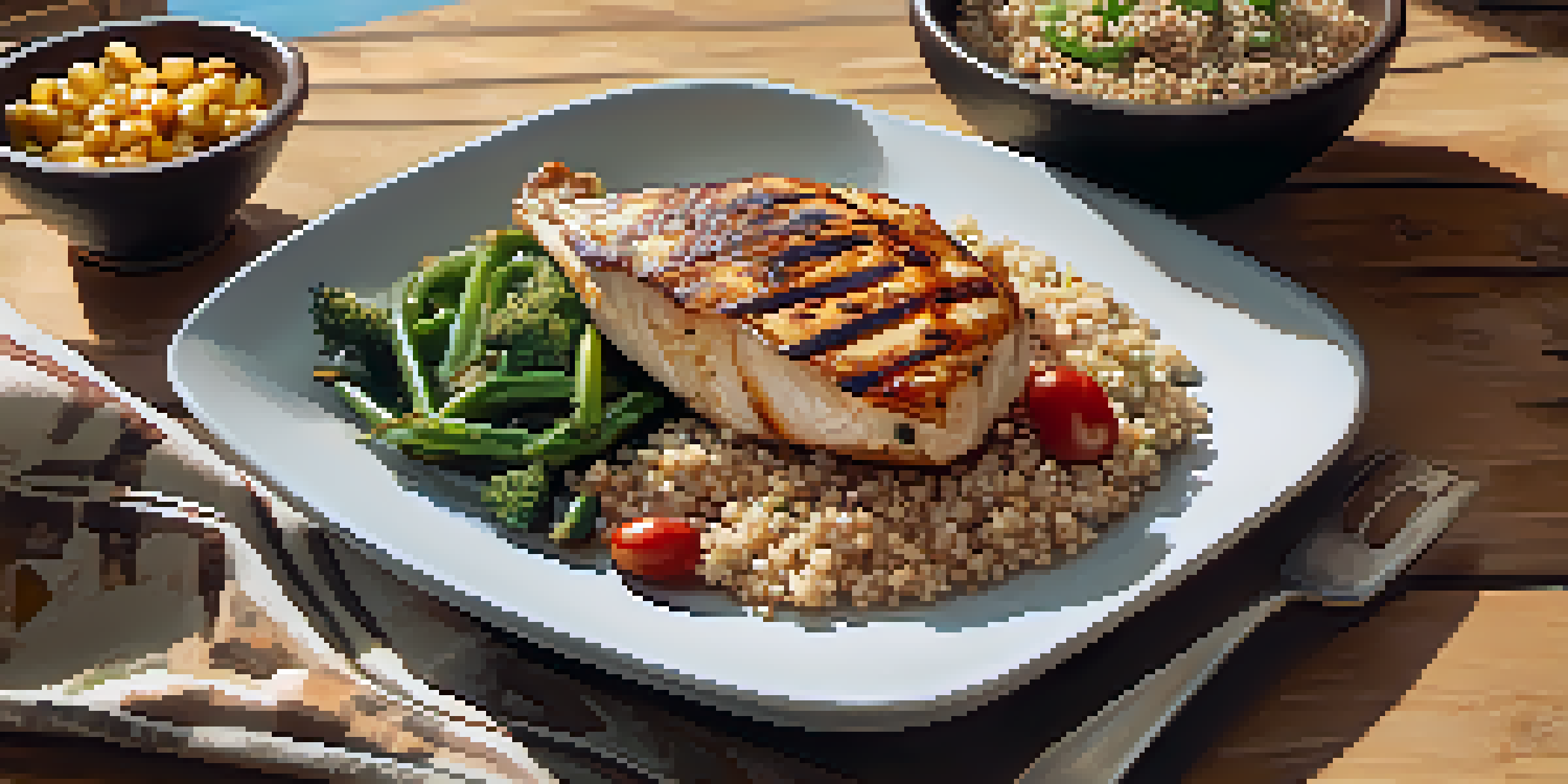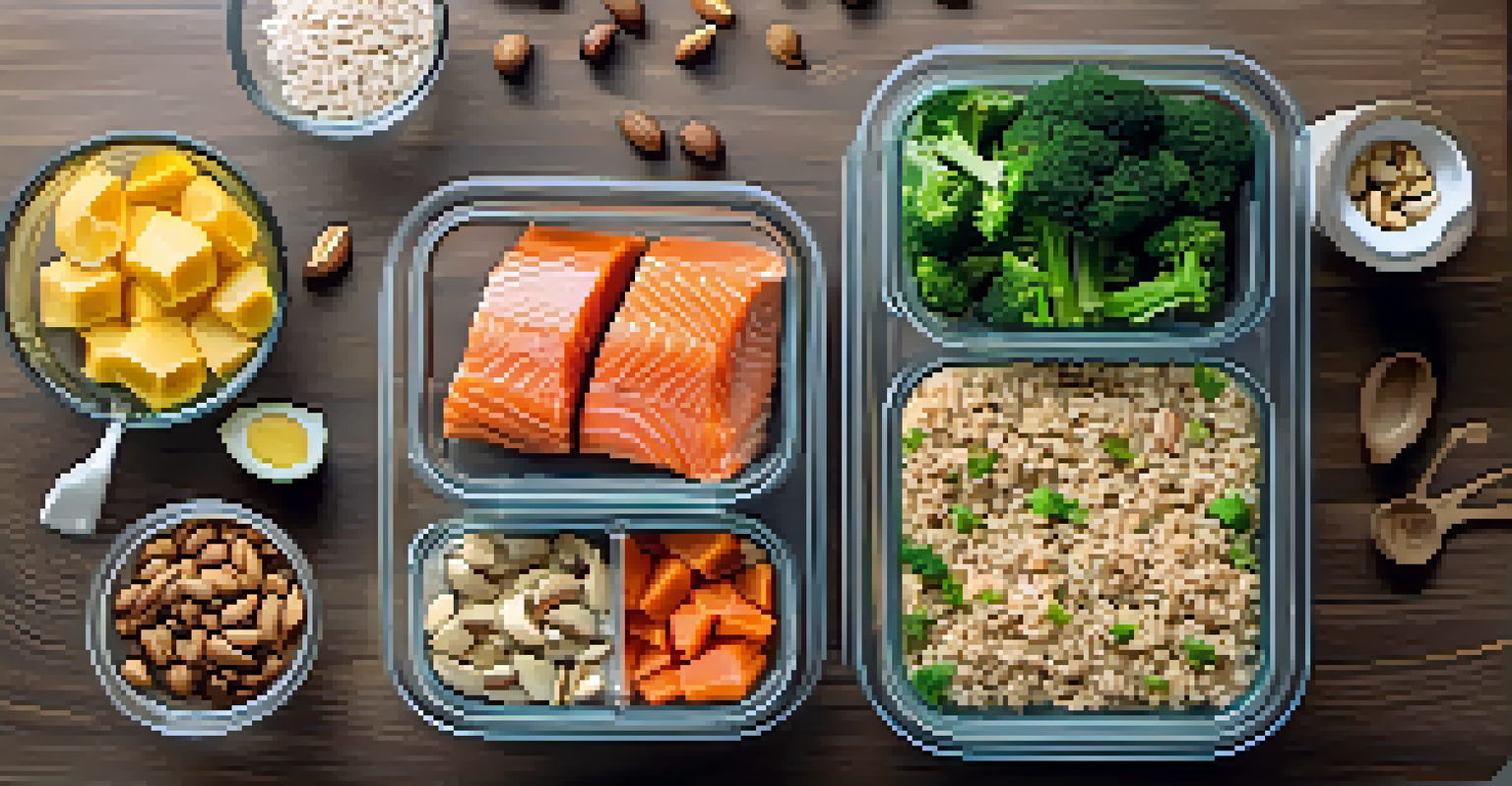The Best Foods for Building Strength in Powerlifting

The Role of Protein in Muscle Building
Protein is the cornerstone of muscle repair and growth, making it essential for powerlifters. Foods rich in protein, like chicken, beef, and legumes, help rebuild muscle fibers that break down during intense training. Ensuring a consistent protein intake can lead to improved strength and performance over time.
Protein is the building block of every cell in our body, and it plays a crucial role in muscle repair and growth.
Incorporating a variety of protein sources is crucial for optimal results. For instance, combining animal and plant-based proteins not only diversifies your diet but also provides a range of amino acids, which are the building blocks of muscle. This variety can help keep meals interesting and enjoyable.
Aim for a protein-rich meal or snack after workouts to maximize recovery. A simple post-workout option could be a protein shake mixed with fruits or some Greek yogurt topped with nuts. This practice not only aids in muscle recovery but also prepares your body for the next training session.
Carbohydrates: Your Energy Source
Carbohydrates are crucial for fueling your workouts and supporting recovery. They provide the energy necessary to power through those heavy lifts and high-intensity training sessions. Think of carbs as the gasoline for your strength-building engine.

Complex carbohydrates, such as whole grains, fruits, and vegetables, are ideal because they release energy slowly, keeping you energized for longer periods. For example, oatmeal or brown rice can be excellent pre-workout meals, offering sustained energy without the crash.
Protein Fuels Muscle Growth
Consistent protein intake from diverse sources is essential for repairing and building muscle after intense workouts.
Including carbohydrates in your post-workout meal can also help replenish glycogen stores depleted during training. Pairing protein with carbs, like a turkey sandwich or a protein bar, ensures that your muscles get the nutrients they need for optimal recovery and growth.
Healthy Fats for Hormone Production
Healthy fats play a pivotal role in hormone production, including testosterone, which is vital for muscle growth. Foods like avocados, nuts, and olive oil should be a staple in your diet to help support these bodily functions. Just remember, not all fats are created equal.
Good nutrition is a foundation for a strong body and strong performance.
Incorporating sources of Omega-3 fatty acids, such as salmon or flaxseeds, can also reduce inflammation and promote recovery after intense workouts. This is especially important for powerlifters who place significant stress on their bodies during training.
Moderation is key when consuming fats, but don’t shy away from them. A balanced diet that includes healthy fats will not only aid in muscle recovery but also enhance overall performance and strength.
Hydration: The Unsung Hero
Staying hydrated is often overlooked but is critical for optimal performance in powerlifting. Water helps regulate body temperature, lubricates joints, and transports nutrients to your muscles. Dehydration can lead to decreased strength and endurance, so drinking enough water throughout the day is vital.
In addition to plain water, consider incorporating electrolyte-rich beverages, especially after intense training sessions. These drinks can replenish lost minerals and help maintain hydration levels, ensuring your muscles perform at their best.
Carbs Power Your Workouts
Incorporating complex carbohydrates in your diet provides the necessary energy for training and aids in recovery.
A good rule of thumb is to aim for at least half your body weight in ounces of water daily, adjusting for activity levels. Keeping a water bottle handy during workouts can serve as a reminder to drink regularly and stay hydrated.
Timing Your Meals for Maximum Gains
Meal timing can significantly impact your performance and recovery in powerlifting. Eating the right foods before and after workouts can boost your energy levels and enhance muscle recovery. It’s all about fueling your body when it needs it most.
A balanced pre-workout meal should ideally include carbs and protein to provide energy and support muscle repair. For example, a banana with peanut butter or a protein smoothie can be a great option to fuel your workout effectively.
Post-workout, aim to eat within 30 to 60 minutes to replenish energy and kickstart recovery. This could include a hearty meal or a convenient protein shake, ensuring your body gets the nutrients it craves after a tough session.
Micronutrients Matter: Vitamins and Minerals
While macronutrients like protein, carbs, and fats are crucial, don’t forget about micronutrients. Vitamins and minerals play essential roles in energy production and muscle contraction, which are vital for powerlifting. A well-rounded diet rich in fruits and vegetables can help meet these needs.
For instance, calcium and vitamin D are important for bone health and muscle function. Foods like dairy products, leafy greens, and fortified alternatives can help ensure you get enough of these essential nutrients.
Hydration is Key for Performance
Staying hydrated supports strength, endurance, and overall performance by regulating body temperature and nourishing muscles.
Moreover, magnesium and zinc support muscle recovery and hormone production. Incorporating foods such as nuts, seeds, and whole grains can enhance your micronutrient intake, ultimately supporting your strength-building efforts.
The Power of Meal Prep for Success
Meal prep can be a game-changer for powerlifters looking to optimize their nutrition. By planning and preparing meals in advance, you ensure that you have healthy, strength-building foods readily available, reducing the temptation to grab unhealthy options. It’s a proactive approach that saves time and energy during busy weeks.
Start by designating a day each week to cook and portion out meals. This could include grilling chicken, cooking grains, and preparing vegetables. Having these components ready to go makes it easier to assemble balanced meals throughout the week.

Additionally, consider keeping healthy snacks on hand, such as protein bars or mixed nuts, to prevent energy dips between meals. This strategy not only keeps you on track with your nutrition goals but also supports your overall strength development.